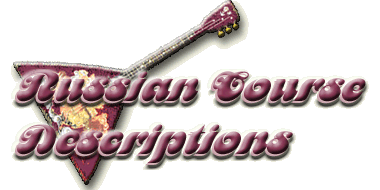
1999-2000 Russian Course Schedule
FN 099-10. Russia and the Internet. An examination of everyday life in Russia as a mirror of historical, ideological, sociological, and economic forces, using Internet and World Wide Web resources. For freshmen only. In English.
FN 099-11. Women in Russia. This course examines the lives, the struggles, and the accomplishment of Russian women. For freshmen only. In English.
RU 101-102. Elementary Russian I & II. Basic training in speaking, reading, writing, and comprehending the Russian language. Fundamentals of language and popular culture. Russian 101 or the equivalent is prerequisite for Russian 102.
RU 103-104.Intermediate Russian I & II. Intermediate points of grammar and a review of elementary grammar. Training in all language skills with the study of cultural texts. Russian 103 or the equivalent is prerequisite for Russian 104.
RU 109. The Russian Cinema (W-1). The development of Russian cinematography is traced through viewing and discussion of major Russian films from the innovations of directors like Eisenstein, Pudovkin, to the poetic-metaphorical aesthetics of Tarkovsky and Abuladze. In English.
RU 125. Russia Yesterday and Today. An examination of everyday life in Russia as a mirror of historical, ideological, sociological, and economic forces. In English.
RU 201. Advanced Russian Grammar. Advanced notions of Russian grammar with a review of intermediate notions. Advanced reading, composition, and conversation. In Russian. Prerequisite: Russian 104 or equivalent.
RU 204. Russian Conversation (half credit). Concentrated development of speaking skills. Conducted entirely in Russian by a native speaker. Intended for students enrolled in 200- and 300-level courses.
RU 205. Russian for Business. Designed for proficiency in business communication skills. Studies the grammar and lexicology of commercial transactions. In Russian. Prerequisite: Russian 104 or equivalent.
RU 209. Russian Complementary Reading. Russian sources read in conjunction with English language courses. Independent course of study established by the instructor and student. Prerequisite: Russian 104 or equivalent.
RU 211. Chekhov: Drama in Prose. Detailed analysis of Chekhov's poetics of theater through close reading and discussion of his major plays. Application of Chekhov's theater poetics to his prose writings for their adaptation for stage. In English.
RU 215. The Changing Image of Women in Russian Culture. This course examines the image of women in Russia through the writing of feminist theorists, politicians, social activists such as Kolantai, Akhmatova, Krupskaya, Tolstaya. In English.
RU 253. Folklore and Ritual. Survey of major approaches to folklore; sociological and psychological functions of folklore. Life cycle rituals and agrarian cycles. Slavic examples. In English.
RU 250. 19th Century Russian Literature in Translation. Survey of 19th century Russian literature. Major trends in Russian literature of the pre-Revolutionary period. Examines the problems of the superfluous man and the rise of realism. In English.
RU 255. 20th Century Russian Literature in Translation. Survey of 20th century Russian literature. Major trends in Russian literature of the Revolutionary and post-Revolutionary periods. Examines the problem of political dissent. In English.
RU 265. Russian Theater of the 19th & 20th Centuries. The history of Russian drama from Pushkin to the present. Gogol, Ostrovsky, Chekhov, Bulgakov in the frameworks of Stanislavsky, Meyerhold, and others. In English.
RU 270. Reading Pravda. Readings and discussions of articles on current events from the Russian press for insight into the changing society and culture. Individual readings on selected topics for term projects. In Russian.
RU 295. Topics in Russian Studies. Readings and discussion of special interest relevant to Russian studies. Topics selected by students in consultation with the instructor. In Russian.
RU 301. 19th Century Russian Culture and Civilization. Cultural and ideological developments from Kievan Russia to 19th century Russia: art and artistic trends in the context of historical events and everyday life. Extensive use of slides and video materials. For advanced students of Russian.
RU 302. 20th Century Russian Culture and Civilization. Cultural developments from Chekhov to the present--the arts of the Silver Age, Socialist Realism, and post-Stalinism in the context of socio-political changes in 20th century Russia. Extensive use of slides and video material. For advanced students of Russian.
RU 311. Readings in Russian Literature. Advanced study of the Russian language through close reading and discussion of short works by major Russian and Soviet writers. In Russian.
RU 312. Russian Guitar Poetry. The rise of a new genre during the post-Stalinist period as a social political, and ethical commentary on the time, through the songs of Vysotsky, Okhudzava, Galich, and others. In Russian.
RU 321. Russian Folklore and Ritual. A study of the rich Russian tradition of epic poetry, ballads, folksongs, proverbs, agrarian and life cycle rituals, as well as theoretical folkloristics. In Russian.
RU 322. Russian through Theater. Advanced studies of the Russian language through reading, discussing, and performing Russian plays. In Russian.
RU 325. Dostoevsky and Tolstoy: Literary Philosophy. An introduction to the major philosophical ideas of F. Dostoevsky and L. Tolstoy, who are not only the two greatest Russian writers, but two of the most profound European philosophers.
RU 350. Advanced Topics in Russian Studies. Readings and discussion of special topics at an advanced level. Topics are selected by the instructor in consultation with students. Prerequisite: successful completion of some 200-level course.
RU 390 Independent Study. Advanced independent research under the supervision of an instructor. Subject to be selected by the student in consultation with the instructor. Prerequisite: permission of the instructor.
RU 393. Honors in Russian. For selected seniors. Topics selected by the student in consultation with the thesis advisor. May be repeated once.
 | ||||
Bucknell University, Lewisburg, PA 17837
©1996 Robert Beard